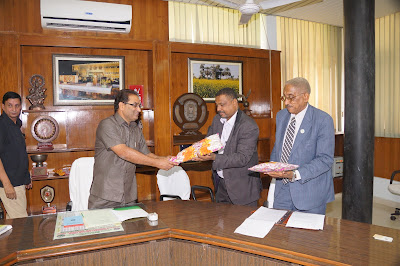Transforming Sudan’s Agricultural Landscape: The Journey
of Mushroom Farming Innovation
At the Mushroom Farming
Technology Incubator, nestled within Al Zaeim Al Azhari University and
supported by Delphe Programme, DFID UK, British council, Central Lab. for
Agricultural Climate-ARC -Egypt and the Ministry of Higher Education &
Scientific Research -Sudan, we embarked on a pioneering journey to
revolutionize agriculture in Sudan. Since 2009, our mission has been clear: to
introduce mushroom farming technology to Sudan, enhancing resilience for
marginal and small farmers, and fostering sustainable agricultural practices.
Our vision was to empower local
farmers by integrating mushroom cultivation into their farming practices. This
innovative approach aimed to improve farm environments by utilizing farm yard
manure, thereby recycling valuable resources. Beyond environmental benefits,
our initiative sought to uplift women and marginalized communities, creating
new opportunities and improving livelihoods.
Mushroom farming is more than
just a new agricultural practice—it’s a step towards diversifying Sudan’s
culinary landscape and boosting nutritional quality. By introducing a variety
of mushroom species, we’ve enriched the Sudanese table, offering new flavors
and enhancing the nutritional profile of local diets. This diversification not
only contributes to better health but also supports the broader goal of
agricultural sustainability.
Our efforts align with the FAO’s
Four Betters: Better Production, Better Nutrition, a Better Environment, and a
Better Life. We’re committed to achieving these goals by ensuring that no one
is left behind. By focusing on innovative farming practices, we’re contributing
to the resilience and sustainability of Sudan’s agricultural sector.
Transforming Sudan’s Agricultural Landscape: The Journey
of Mushroom Farming Innovation
At the Mushroom Farming
Technology Incubator, nestled within Al Zaeim Al Azhari University and
supported by Delphe Programme, DFID UK, British council, Central Lab. for
Agricultural Climate-ARC -Egypt and the Ministry of Higher Education &
Scientific Research -Sudan, we embarked on a pioneering journey to
revolutionize agriculture in Sudan. Since 2009, our mission has been clear: to
introduce mushroom farming technology to Sudan, enhancing resilience for
marginal and small farmers, and fostering sustainable agricultural practices.
Our vision was to empower local
farmers by integrating mushroom cultivation into their farming practices. This
innovative approach aimed to improve farm environments by utilizing farm yard
manure, thereby recycling valuable resources. Beyond environmental benefits,
our initiative sought to uplift women and marginalized communities, creating
new opportunities and improving livelihoods.
Mushroom farming is more than
just a new agricultural practice—it’s a step towards diversifying Sudan’s
culinary landscape and boosting nutritional quality. By introducing a variety
of mushroom species, we’ve enriched the Sudanese table, offering new flavors
and enhancing the nutritional profile of local diets. This diversification not
only contributes to better health but also supports the broader goal of
agricultural sustainability.
Our efforts align with the FAO’s
Four Betters: Better Production, Better Nutrition, a Better Environment, and a
Better Life. We’re committed to achieving these goals by ensuring that no one
is left behind. By focusing on innovative farming practices, we’re contributing
to the resilience and sustainability of Sudan’s agricultural sector.
Leading this initiative has been
a remarkable journey, and I am profoundly grateful for the unwavering support
of our dedicated team. A special thank you goes to Houssam, Omer, Mustafa,
Saria, and our talented students—Nahid, Namerig, Sief-Aldoula. Their insights,
hard work, and commitment have been invaluable in driving our mission forward.
Honouring the memory of my dear Chief and sister, Fatma Izzeldin Abdalla, whose
unwavering dedication to life’s culinary artistry touched us all. Fatma was the
heart and soul of every live kitchen performance, infusing each event with her
passion and unparalleled skill.In these turbulent times, their contributions
and the collective effort of all researchers, students, and farmers involved
have been a beacon of hope. Together, we are shaping a brighter, more
sustainable future for Sudan’s agriculture.
These are major achievement;
Strategic Communication and Advocacy:
Developed and executed comprehensive communication strategies to promote
mushroom farming technologies and the incubator’s achievements, enhancing
visibility and stakeholder engagement.
- Stakeholder
Engagement: Built and maintained robust relationships with media
outlets, regional agricultural associations, and strategic partners,
including ICAR-DMR, ARC-Egypt , Mahatma Phule Krishi
Vidyapeeth Rahuri-University in India, Pune agriculture college ;
Institute of Edible Fungi-shanghai academy of agriculture Sciences.
- Fostered
collaboration to advance mushroom farming initiatives across multiple
regions.
- Content
Creation: Produced and disseminated impactful outreach materials,
including brochures, reports, and multimedia content. Ensured high-quality
communication of key messages through various platforms.
- Event
Management: Organized stakeholder dissemination workshops, live
kitechen performance and led 121 seminars and 50 training sessions,
providing vital knowledge transfer and economic empowerment to over 50
entrepreneurs. Coordinated outreach events to support mushroom farming
ventures and regional development.
- Digital
Communication: Managed the incubator’s digital presence, improving
outreach effectiveness and engagement. Implemented strategies to keep the social
media accounts updated with relevant information and resources.
- Partnership
Development: Established 17 strategic collaborations, securing
$100,000 in additional funding and resources. Developed partnerships with
influential institutions to support innovation and extend the incubator’s
impact.
- Operational
Efficiency: Directed the efficient management of facilities and
equipment, reducing costs by over 20% through energy-efficient practices
and optimized maintenance.
- Funding
and Resource Acquisition: Secured $174,500 in research grants, driving
the development of innovative mushroom farming technologies and enhancing
the incubator’s capabilities.
- Strategic
Planning and Implementation: Realized 12 out of 13 objectives in a
comprehensive five-year strategic plan, guiding the incubator’s growth and
technological advancements.
- Research
dissemination: pioneer several research initiatives and drafting
several articles in peer review journal and National media

















